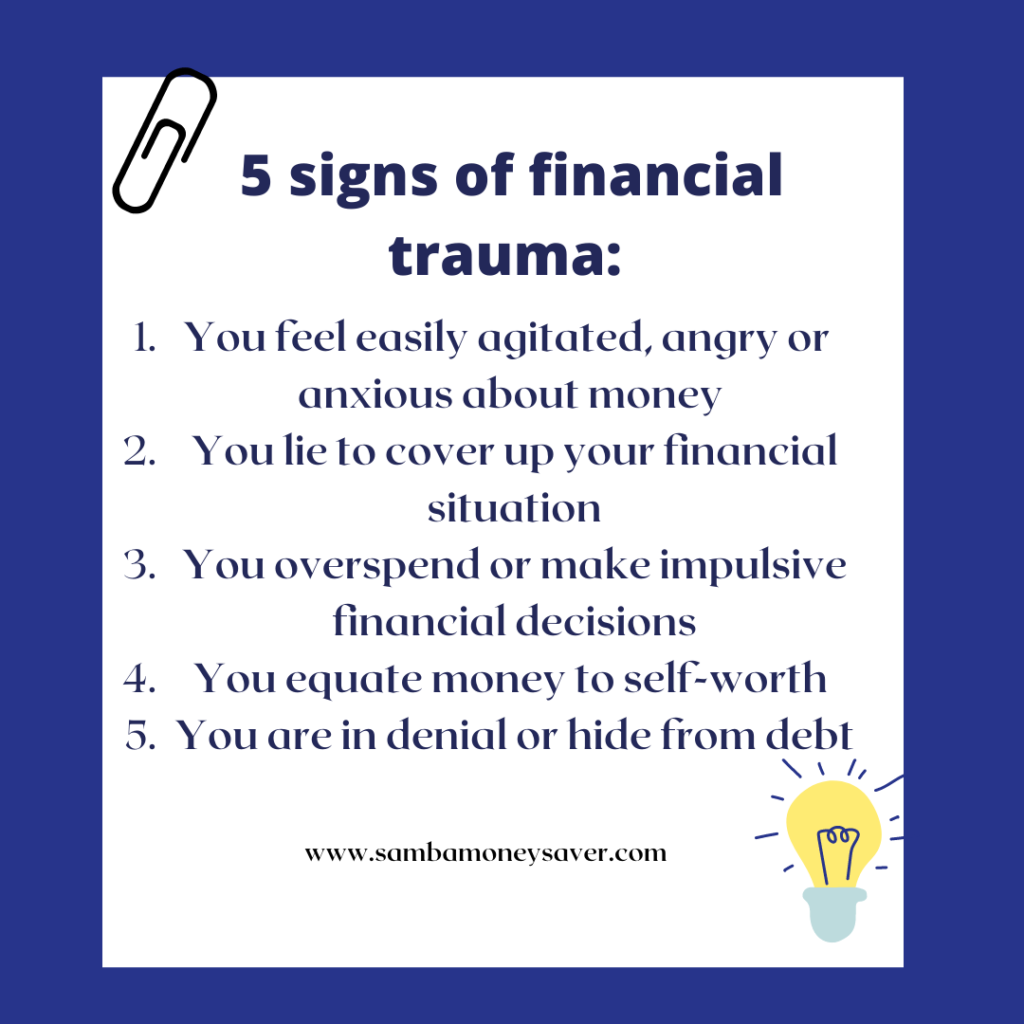Background
In 2019, Forbes reported that financial trauma affects one third of millennials! And that was BEFORE the pandemic recession!! Forbes’ 2019 finding is shocking, but not surprising. Given the disproportionately high number of people from Generation Y alone who are affected by financial trauma, we can assume that this is a widespread social and economic phenomenon that needs more attention.
I believe that part of the reason why so many people suffer from financial trauma is partly because they don’t know that they are suffering from financial trauma. That’s why knowing FT is, what causes it, and being able to identify the ways that it shows up in your life is essential to being able to curb the suffering. Then, with all that smoke and smog out the way, you’ll be on your way to achieving better financial health, and eventually financial independence.
What is financial trauma?
What is important is to first understand that the word ‘trauma’ should not be reserved for the suffering caused by the most extreme or rare situation that the brain can fathom. Because, as we’ve just established, FT is a widespread and far-too-common issue.
To keep it short and as all-encompassing as possible, financial trauma is often caused by a pro-longed situation in which a person’s income is less than their outgoings. This then causes PTSD-like symptoms (sometimes even PTSD itself) and shows up as ‘dysfunctional reactions to chronic financial stress’. Financial trauma can show up in many ways in our lives. Having money means different things to different people…
What are the signs of financial trauma when handling your money?
If you have experienced money problems and financial hardship; struggled to pay rent; or remember parents struggling to pay rent, then it’s really no wonder that you have a guard up around your money life in adulthood. Money represents many things in this 21st century- some of those things being stability, security, shelter, nourishment, and opportunities such as travel, leisure and even work (working often requires some degree of financial investment for clothes, transport, lunch etc).
Avoiding your money problems is an instinctive response to feeling threatened by money over an extended period. Our bodies go into fight or flight mode as with any other threat to personal safety. Avoidance, dishonesty, paranoia, fear, stress can lead to disorganised money management and trap you in a cycle of poor financial health and therefore continued trauma.

Overcoming it:
1 Assess your situation
Assessing your situation includes identifying your unhealthy money habits and accepting the financial facts of your life. Sit with yourself for as long as it takes to determine what your financial situation is…go through letters and bank statements etc. Look for trends to identify what your unhealthy money habits are and where they come from in order to better understand your triggers. The more detailed your assessments are, the more specific you can be when trying to overcome the impacts of financial trauma in your life.
2 Make a plan
Make a plan to regain control of your financial habits and health. If for e.g. you have calculated that you owe a total of 10,000 or in debt to multiple lenders. Make a plan detailing how you could start to payback these debts using for instance the debt snowball or the debt avalanche approach (you can read more about those approaches here 10 Best Ways To Approach Paying Off Debt – Secret To Finance). If you are an impulsive spender, start by removing temptation- leave your card at home when you go out or have an accountability partner who you have to consult before you spend anything above €10.
3 Speak about it
The Samba Money Saver blog is a fierce advocate of speaking about our financial lives. It takes bravery to let your guard down around money and it can make you feel very vulnerable. But the bravery is rewarding. Speaking about your financial troubles means you are no longer isolated by your money issues and no longer have to lie to cover up your financial situation. This in turn, will help with feelings of agitation and anxiety and paranoia. Talking about your financial trauma and your money situation, immediately helps to alleviate the burdensome feeling that your money troubles are unique to you alone.
4 Change your mindset
Do some introspective work and adjust your money mindset by reframing what money means to you. Know that your self-worth does not come from having money but from being a clean-hearted person. As I said in last week’s blog (The Moment that Changed my Financial Life – sambamoneysaver.com The Moment that Changed my Financial Life), we need to know that financial suffering is NOT our destiny and this requires dedication, hard work and self-belief. It is important to truly believe that there is a way out, because there is.
5 Seek help
Use the plentiful resources that exist- from instagram “finfluencers” to professional financial coaches and advisers in order to educate yourself and improve your financial literacy skills. This will help you to start managing your situation with a detailed plan. There are people and resources out there who/which are designed to guide you through your journey to good financial health. It can be very beneficial to to reach out to someone neutral, outside of your circle for information and advice. Use what is available to you.
Wherever you are on your financial journey, know that feelings of financial doom do not have to be a part of your future even if they are a part of your life right now. There are ways of addressing and overcoming financial trauma. The important thing is to start managing your situation. These 5 tips can help to get you started on that journey. Keep your head up and take control. I believe in you.

